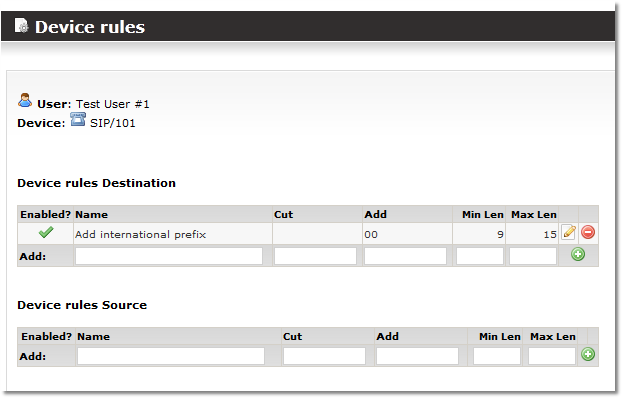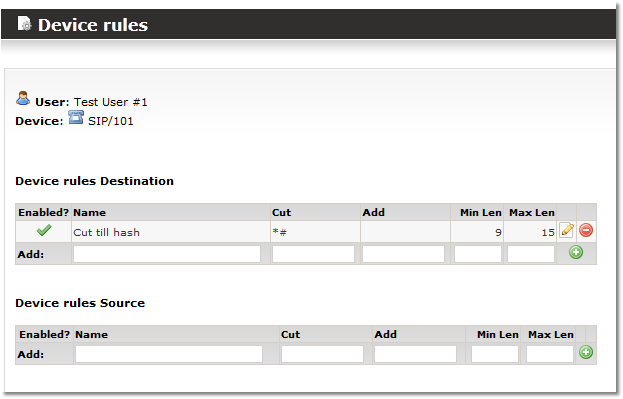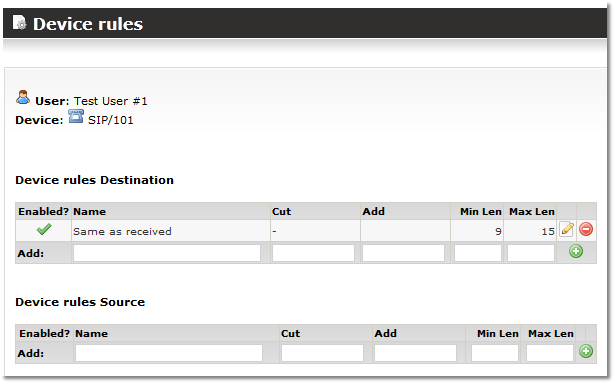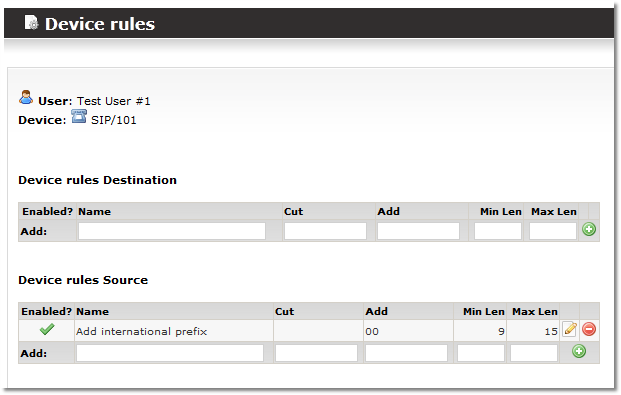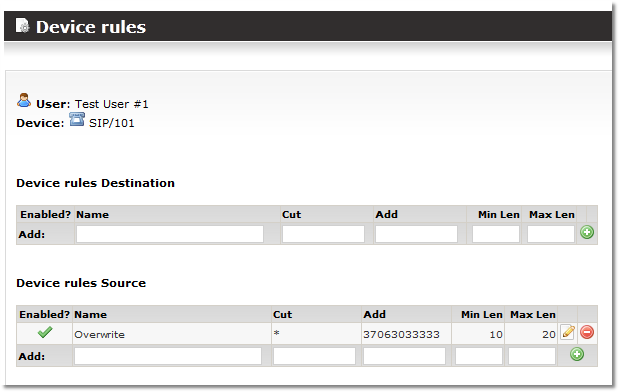Difference between revisions of "Device Rules"
| Line 11: | Line 11: | ||
Device Rules can be reached by clicking the [[Image:rules.png]] icon next to a Device in the Devices window: | Device Rules can be reached by clicking the [[Image:rules.png]] icon next to a Device in the Devices window: | ||
'''IMPORTANT: Device Rules are applied ONLY to those devices which are accessible over DID!''' | |||
[[Image:dev_rules1.png]] | [[Image:dev_rules1.png]] | ||
We see a similar window as the one in Localization. The rules to manage | We see a similar window as the one in Localization. The rules to manage Device Rules are identical to those for Localization management, which are covered [[Number Manipulation | here]]. | ||
| Line 20: | Line 21: | ||
= Destination Localization Rules = | = Destination Localization Rules = | ||
Let's say our | '''IMPORTANT: Localization Rules only matter to the Trunks (Devices marked as Trunks). Because simple Devices do not care about Destination.''' | ||
Let's say our device/trunk expects to get a number with the international prefix 00. We can do this in following way: | |||
[[Image:dev_rules2.png]] | [[Image:dev_rules2.png]] | ||
That's it – very simple. Now every number that is sent to this | That's it – very simple. Now every number that is sent to this Device will be transformed by adding our created int. prefix. | ||
For example, if 37063011111 should be sent to this Device, this rule will be activated and the number 0037063011111 will be sent to Device. | |||
== Special cases == | == Special cases == | ||
| Line 51: | Line 52: | ||
=== Destination same as received === | === Destination same as received === | ||
If you want to send a number to a | If you want to send a number to a Device exactly as it was received, set Cut = '-' (minus sign as shown in the screenshot). | ||
That way, the same number that comes to MOR also leaves MOR: | That way, the same number that comes to MOR also leaves MOR: | ||
| Line 62: | Line 63: | ||
= CallerID Localization Rules = | = CallerID Localization Rules = | ||
Source Rules manages CallerID which is sent to this particular | Source Rules manages CallerID which is sent to this particular Device. | ||
In the example bellow we will add international prefix to every CallerID sent to this | In the example bellow we will add international prefix to every CallerID sent to this Device: | ||
[[File:dev_rules5.png]] | [[File:dev_rules5.png]] | ||
| Line 73: | Line 74: | ||
=== CallerID overwrite === | === CallerID overwrite === | ||
Sometimes | Sometimes Trunks only accept calls with special format CallerIDs. | ||
It is possible to overwrite any CallerID before sending a call to such a | It is possible to overwrite any CallerID before sending a call to such a Device. | ||
In | In Device Rules (for this Device) set up the Rule: | ||
[[Image:dev_rules6.png]] | [[Image:dev_rules6.png]] | ||
In this example, all calls going to this | In this example, all calls going to this Device will have CallerID = 37063033333 | ||
<br><br> | <br><br> | ||
Revision as of 12:01, 17 June 2012
Device Rules transforms an E.164-compatible number to any number format the Device requires.
Description
Different Devices expect different number formats from you. You can send them whatever they want using Device Rules.
Device Rules are only used when Device is reached over DID. Local calls between Devices will not use Device Rules.
Device Rules can be reached by clicking the ![]() icon next to a Device in the Devices window:
icon next to a Device in the Devices window:
IMPORTANT: Device Rules are applied ONLY to those devices which are accessible over DID!
We see a similar window as the one in Localization. The rules to manage Device Rules are identical to those for Localization management, which are covered here.
Destination Localization Rules
IMPORTANT: Localization Rules only matter to the Trunks (Devices marked as Trunks). Because simple Devices do not care about Destination.
Let's say our device/trunk expects to get a number with the international prefix 00. We can do this in following way:
That's it – very simple. Now every number that is sent to this Device will be transformed by adding our created int. prefix.
For example, if 37063011111 should be sent to this Device, this rule will be activated and the number 0037063011111 will be sent to Device.
Special cases
Cut everything till Hash
With rule Cut: *# it is possible to cut everything till # (# included) in the dialed destination:
For example:
- Dialed number: 999#37063042439.
- After Localization: 37063042439.
This function can be used in fancy MNP (Mobile Number Portability) schemes and perhaps elsewhere.
NOTE: Add value still can be used to add any value after Cut is used on the Destination.
Destination same as received
If you want to send a number to a Device exactly as it was received, set Cut = '-' (minus sign as shown in the screenshot).
That way, the same number that comes to MOR also leaves MOR:
CallerID Localization Rules
Source Rules manages CallerID which is sent to this particular Device.
In the example bellow we will add international prefix to every CallerID sent to this Device:
Special Case
CallerID overwrite
Sometimes Trunks only accept calls with special format CallerIDs.
It is possible to overwrite any CallerID before sending a call to such a Device.
In Device Rules (for this Device) set up the Rule:
In this example, all calls going to this Device will have CallerID = 37063033333

